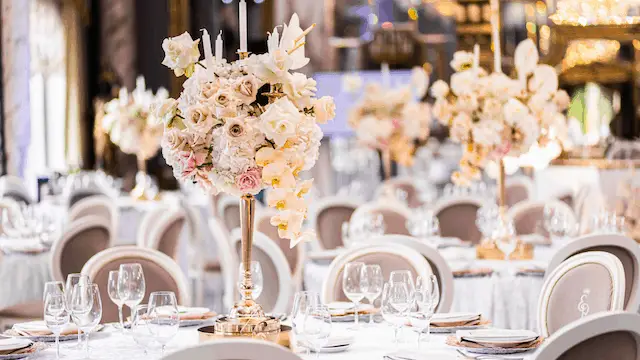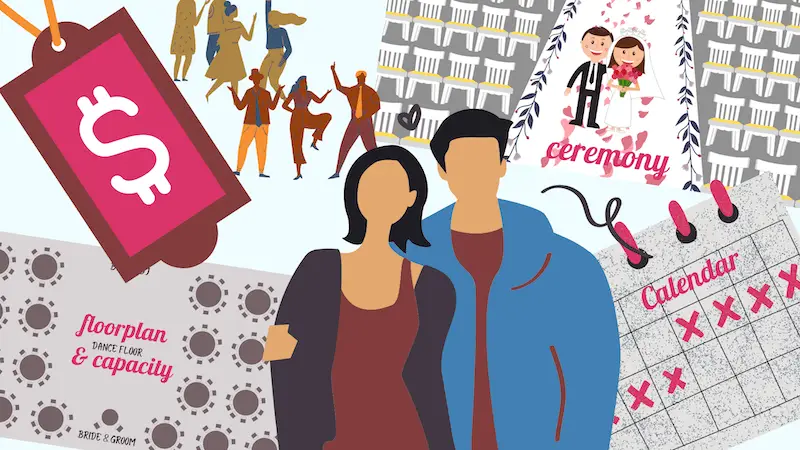Choosing Your Wedding Date: 10 Things You Should Consider
Choosing your wedding date can be tricky, and it’s important to move quickly if you are going for popular dates since wedding venues can fill up.
The top wedding dates in the US are Saturday evenings in October.
Almost everywhere in the country, the weather is pleasant and mild during this month. It is conveniently situated a few weeks after summer and before the holiday season when most people get very busy again.
There are many other factors to consider when choosing your date – should you book your wedding on a long holiday weekend or stay away from it?
Choosing your wedding date will affect everything from how much time is available to plan, which vendors have open dates, what type of flowers are in season, and when most guests are free from work and other obligations.
With these things in mind, here are some questions and tips that can help you choose an ideal date for your big day!
1. What Months Are Considered Off-season For Weddings For Possible Better Pricing?
Most venues consider January, February, and March to be the off-season, at least in regions with four distinct seasons.
In some bigger cities, the months of July and August are also considered off-season. This is because more people leave the city during the hot summer months due to vacations and intolerable heat in some places.
Locally December may be considered an off-season for weddings for some regions due to the holidays. But in the same way, don’t expect a bargain.
Some regions may consider it is on-season driving up the price for weddings due to the corporate competition to host their holiday parties and end-of-year events.
2. What Time Of Year Is The Cheapest To Get Married?
If you plan to get married in the US, it is cheaper to get married during winter.
With Martin Luther King Jr. Day in January and Presidents Day in February, those two long weekends are ideal for a wedding, even in the middle of winter.
However, contrary to popular belief, not every venue will be willing to offer heavily discounted rates for their wedding package during the winter since their costs (mainly labor and food and beverage costs) are not any different from the rest of the year.
If you are negotiating with a venue over their pricing, you may need to accept that they sometimes rather walk away from a deal than give up their profit margin, but you can still try and negotiate for lower rates.
Revealing and sharing the pricing you received from a competing venue to the venue that you are really interested in is very powerful and can do the trick.
In the off-season, salespeople become extremely competitive as they are trying to fill the books.
Hotel accommodations are another great incentive for you and your guests, as hotels are trying to fill their overnight rooms at deep discounts in off-peak season.
Photographers, bands, and DJs might also be willing to negotiate with you since they will want to secure you as a customer with fewer weddings in the winter.
As far as flowers, normally, winter is not the best time to get a bargain since their natural growing period is during spring and summer.
3. Do You Pick A Wedding Date Or Venue First?
There are reasons for some couples to select their wedding date first if it has a special meaning for them that is not negotiable.
It could be the date on which they have met the first time, a particular number combination (03/14 (pi-day), or 11/11 (spiritual significance)), or their schedules are already full attending other weddings or family events.
If you are in a situation where your date is non-negotiable, you have to accept that your choices of finding the perfect venue could become dismally limited.
You may not find a venue that suits the time of year or location you want to get married, during your limited timeframe.
Many couples start by finding their wedding venue first and then picking the date according to what works best with the locale they picked out.
If you are flexible, don’t worry about whether to pick a wedding date or venue first; instead, do the opposite and go with what date is available when you find a venue that matches your needs.
Then narrow down your list of venues and pick out the date that works best in conjunction with all the other moving parts of your wedding, or otherwise, be prepared to be flexible!
4. What Day Of The Week Is Best For A Wedding?
For most guests, a Saturday evening wedding on a non-holiday weekend is the best day of the week for a wedding. The next best day of the week is a Sunday daytime wedding.
Friday evenings are not ideal for most people since they may need to take that day off from work, or if this is not an option, rush home, get ready, and hurry to the wedding. The only reconciliation is that you can sleep in the next day when you are going to a Friday evening wedding.
Long, three-day holiday weekends are a two-edged sword. On the one hand, they seem ideal since there is a lot of time to recover and take things easy, but on the other hand, with everyone’s busy work life, these long-awaited weekends can be difficult to give up for some people who want to get off the grid.
In this context, it is much better to do the wedding again on a Saturday evening so that there are still two full days of the weekend to enjoy.

5. Is It Cheaper To Get Married On A Weekday?
Yes and no. It is a mixed bag depending on what type of venue you have in mind for your wedding and their overall revenue streams during the week.
In general, weddings on weekdays are usually more affordable than those on weekends.
Saturday evenings are the most expensive, followed by Sundays, then Fridays, followed by the rest of the week.
But don’t be completely fooled by this rule of thumb, as even weekday weddings can be pricey depending on the date and location and if it is a popular venue.
If you are planning a hotel wedding, you could compete with corporate events that these venues host during the week. These events are typically more profitable, and a venue may need to think twice if they would prefer hosting a wedding.
Hotels’ primary goal is to fill their overnight rooms during the week. However, they often would prefer groups with a large room block staying multiple nights, in conjunction with an all-day meeting attached to the booking.
As a side note, Saturday evenings are the most expensive nights for weddings since these are the most popular nights. And there are only 52 Saturdays available in a year out of 365 days, with 2.5 Million couples looking for a wedding venue.
Exceptions do exist, however. It can be appealing for a venue to offer a discount if they have never sold one of these Saturdays, and there is no chance that they will anytime soon.
The closer you get to a not filled date, the more pressure salespeople will feel to fill the venue, and you may snatch a discount.
6. What Is The Most Expensive Month To Get Married?
There is not one most expensive month, but on the whole, May plus June and September through December are typically the most expensive months to get married.
If you count in overnight rooms for your out-of-town guests, hotels in big cities will have their highest room rates of the year when the city traditionally fills up. New York City is, for example, an extreme model for sky-high rates during UN week and the first three weeks in December.
If you are not in the hospitality industry, you will be surprised to learn how much rates yield around the ups and downs of the local market and go by the good old demand & supply rule. It is very much like the airline industry.
Even a peak month can offer you a compelling position to negotiate a great wedding package, just because a venue didn’t sell some dates for whatever reason and the expectation to sell those dates is hardening.
This situation occurs when the booking window is getting smaller and smaller (usually less than six months for weddings), and the venue’s expectations of selling the date are vanishing.
7. Religious Customs And Limitations To Choosing Your Wedding Date
A good rule of thumb is not to book a date that falls during major holidays or religious observances if possible.
Depending on your faith, you may not be able to pick a date that would otherwise work with the wedding venue.
For example, Sundays can become difficult for catholic couples since many catholic churches hold regular mass and won’t perform a wedding. In addition, many catholic churches won’t hold ceremonies during Lent.
Jewish weddings can be held on any day of the week except for the Jewish Sabbath, which begins with sundown on Friday until sundown on Saturday.
If you aim for a Saturday night, check at what time sunset is taking place in your particular geographical region to do the ceremony. Then, add about 45 minutes (or whatever travel time is needed) after sundown for the invitations to provide travel time for the rabbi.
8. Avoid Holidays With A Family Focus To Host Your Wedding
Typically, the closer you book your wedding to a major federal holiday (Christmas, Thanksgiving) or religious holiday (i.e., Easter, Passover), the less your guests will be interested in attending.
Valentine’s Day, Mother’s Day, Father’s day, and New Year’s eve going into New Year’s day are also tricky dates because many people will want to spend those days with family.
So while these may be options for an available wedding venue, it’s best to consider the timing of your date carefully.
9. Check The Availability Of Your Wedding Party
If your maid of honor or best man is going to have other commitments, would you want to book a date that works for them as well?
It’s a tricky question.
You want to pick the perfect day, but you also need to consider what is going on with those around you, including the maid of honor, bridesmaids, best man, and groomsmen.
If you can’t bring everyone under one hat, then maybe you should consider a date that works for the majority of your wedding party, or at least those who are important to you and can’t be replaced.
10. Vendors Availability On Your Wedding Day
In addition, the date that you choose will have a major impact on many of your vendors’ availability, such as music (bands, DJs), photographers, florists, officiants.
There is unfortunately not much you can do about it, and if you are after a specific band, you would need to simultaneously check both the venues’ and the vendor’s availability at the same time to make it work.
Flexibility and adaptability are the keys, and taking care of the date first is a step in the right direction.
In Conclusion
So, now that you know everything about choosing the perfect wedding date for your big day, it’s time to take a deep breath.
Take some time to enjoy being engaged before deciding on anything more. You will have accomplished a major step when you have settled in and locked in a date at your venue.


